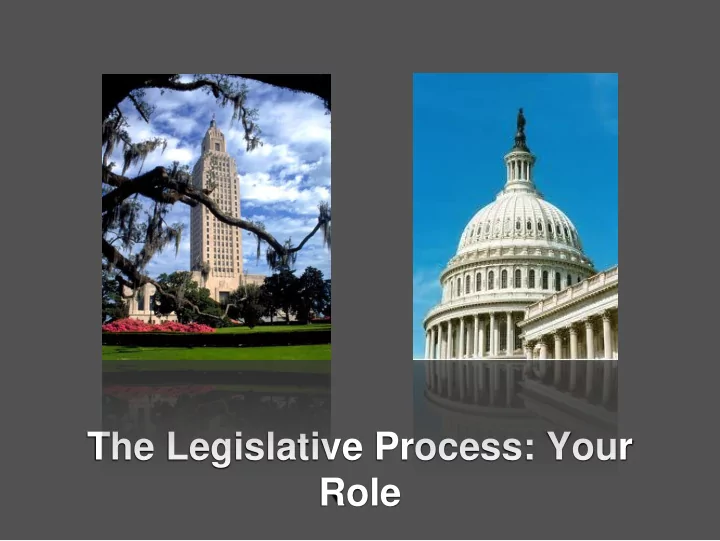

The Legislative Process: Your Role
Overview • How laws impacting FQHC’s are made • Advocacy: Shaping what those laws do • why? • how? • ethics!
How Laws Impacting FQHC’s Are Made • State Law • by the State Legislature • by Rulemaking Bodies • through the State Budgeting Process • by the Courts
How Laws Impacting FQHC’s Are Made • Federal Law • by Congress • by Rulemaking Agencies • through the Federal Budgeting Process • by Federal Courts
How Laws Impacting FQHC’s Are Made • ADVOCACY - how laws are REALLY made.
State Level Legislation • 105 Representatives (House) • governed by the Speaker of the House • 39 Senators (Senate) • governed by the Senate President
State Level Legislation • Even numbered years - 60 legislative day session; 85 calendar days; NON Fiscal Session • Odd numbered years - 45 legislative day session; 60 legislative days; Fiscal Session
“Bills” • Legislative instruments are often called bills, but there are other types of instruments that also have “the force and effect of law” • Are drafted by “authors” • Must get Committee approval • at the state level: House and Senate Health and Welfare, or House and Senate Insurance • Must pass the “floor” of both chambers
Rules/Regulations • Rulemaking “authority” is constitutionally delegated to rule making “bodies” or agencies by the legislature/congress through the state and federal constitutions. • As rules are developed, the boards/commissions that make them must comply with the public notice requirements laid out in the state or federal administrative procedures act.
Rules/Regulations • Once rules become final they are codified, and become part of the state or federal law - meaning they carry the same weight as “bills” passed by congress or the state legislature. (This body of law is known as “administrative law”) • Why worry about rules and regulations? • they fill the gaps between the general directives from the legislature • they control almost every aspect of your day to day operations • they can become custom made for special interests if stakeholder voices are left out of the process
Why Advocacy? • Advocacy is really what “makes” the laws and regulations impacting FQHC’s • Part of furthering the mission of FQHC’s: • expanding access to high quality care can’t happen without advocacy • growing FQHC community impact won’t happen if FQHC’s don’t thrive
How Advocacy? • Communicate with those who influence policy. • Be a resource, not an annoyance.
Know Your Representatives • Talk to them BEFORE you “need” something. • Ask what you can do to support them as they support you.
Educate Your Representatives • Do they know what an FQHC is? • Do they really understand how an FQHC is funded? • Have they seen your facility? • Do they know how many of their constituents utilize the FQHC in their district for primary care?
Utilize Technology!
Communicating at Home and at the Capitol • LPCA Lobby Day! • Committee Hearings on important policies • Involvement in the rule making process
Ethics • Advocacy vs. Lobbying • PUBLIC ENGAGEMENT IS NOT LOBBYING • Advocacy is broader than lobbying, but may include lobbying • Lobbying seeks to influence the outcome of legislation or elections
Ethics • Lobbying vs. Advocacy • there are limitations on the amount a non-profit can spend on lobbying • there are NO limitations on the amount a non-profit can spend on advocacy
Ethics Lobbying vs. Advocacy • Did you expend money on an elected or appointed official in order to advocate for a particular position? • Consult ethics regulations to see if you qualify as a person who needs to register as a lobbyist at the state or federal level • Non- profits have special rules regarding how much of their budget can be spent on “lobbying” • Grant recipients and special tax exempt orgs have even more regulations to worry about • Did you intend to affect the outcome of an election ? • This is called “political activity” and triggers tax exempt organization rules regarding expenditures and activities • Doing GOTV is allowed, as long as you are not recommending or endorsing particular candidates
• Did you intend to affect the outcome of a particular piece of legislation ? • If you are not paid to do this, or if it is within the scope of your job duties but doesn’t constitute more than a certain percentage of your job duties, no need to register as a lobbyist. • example: Testifying a couple of times on a bill that impacts your FQHC, sending written comments on a rule, etc. does not require you to register as a state lobbyist. • Did you intend to get government to take a particular action ? • this could be “executive branch lobbying;” see above • Were you paid to do any of the above? • depending upon how much of your time “lobbying” takes up, this could mean you need to register as a lobbyist. • if your salary includes payment for lobbying duties it will count towards the amount your org can spend on “lobbying”
Focus Strategies LLC info@focusstrategiesla.com
Recommend
More recommend